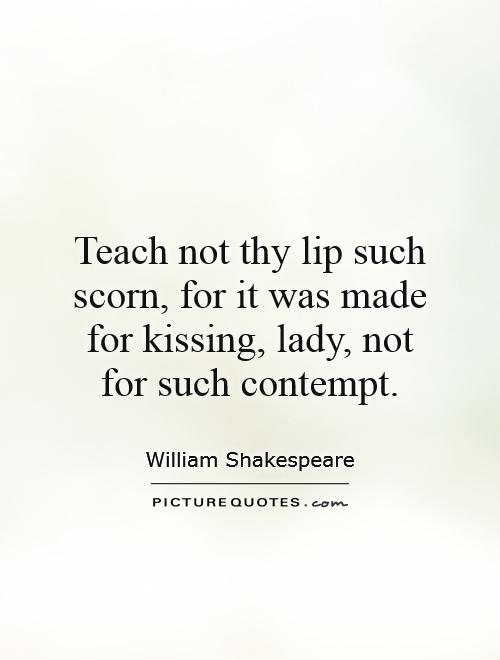Teach not thy lip such scorn, for it was made for kissing, lady, not for such contempt

Teach not thy lip such scorn, for it was made for kissing, lady, not for such contempt
The line "Teach not thy lip such scorn, for it was made for kissing, lady, not for such contempt" is a powerful and poignant statement made by the character Berowne in William Shakespeare's play "Love's Labour's Lost". In this line, Berowne is pleading with the object of his affection, Rosaline, to not show disdain or contempt towards him, as her lips were meant for kissing and love, not for scorn.This line encapsulates the theme of love and courtship that runs throughout the play. Berowne is expressing his desire for Rosaline to reciprocate his feelings and to not reject him with disdain. He is reminding her that her lips, which are traditionally associated with love and affection, should not be used to show contempt or rejection.
The use of the word "scorn" in this line is significant, as it conveys a sense of rejection and disdain. Berowne is urging Rosaline to not reject him or show contempt towards him, but instead to embrace love and affection. By reminding her that her lips were made for kissing, Berowne is appealing to her sense of romance and passion.
This line also highlights the power of language and rhetoric in Shakespeare's plays. Berowne's words are eloquent and persuasive, as he uses language to appeal to Rosaline's emotions and desires. The use of the word "lady" in this line also adds a sense of formality and respect, as Berowne is addressing Rosaline with courtesy and admiration.
Overall, this line from "Love's Labour's Lost" is a beautiful and heartfelt plea for love and affection. It captures the essence of courtship and romance, and reminds us of the power of love to overcome scorn and contempt. Shakespeare's words continue to resonate with audiences today, as they speak to the universal themes of love, desire, and the complexities of human relationships.












 Friendship Quotes
Friendship Quotes Love Quotes
Love Quotes Life Quotes
Life Quotes Funny Quotes
Funny Quotes Motivational Quotes
Motivational Quotes Inspirational Quotes
Inspirational Quotes